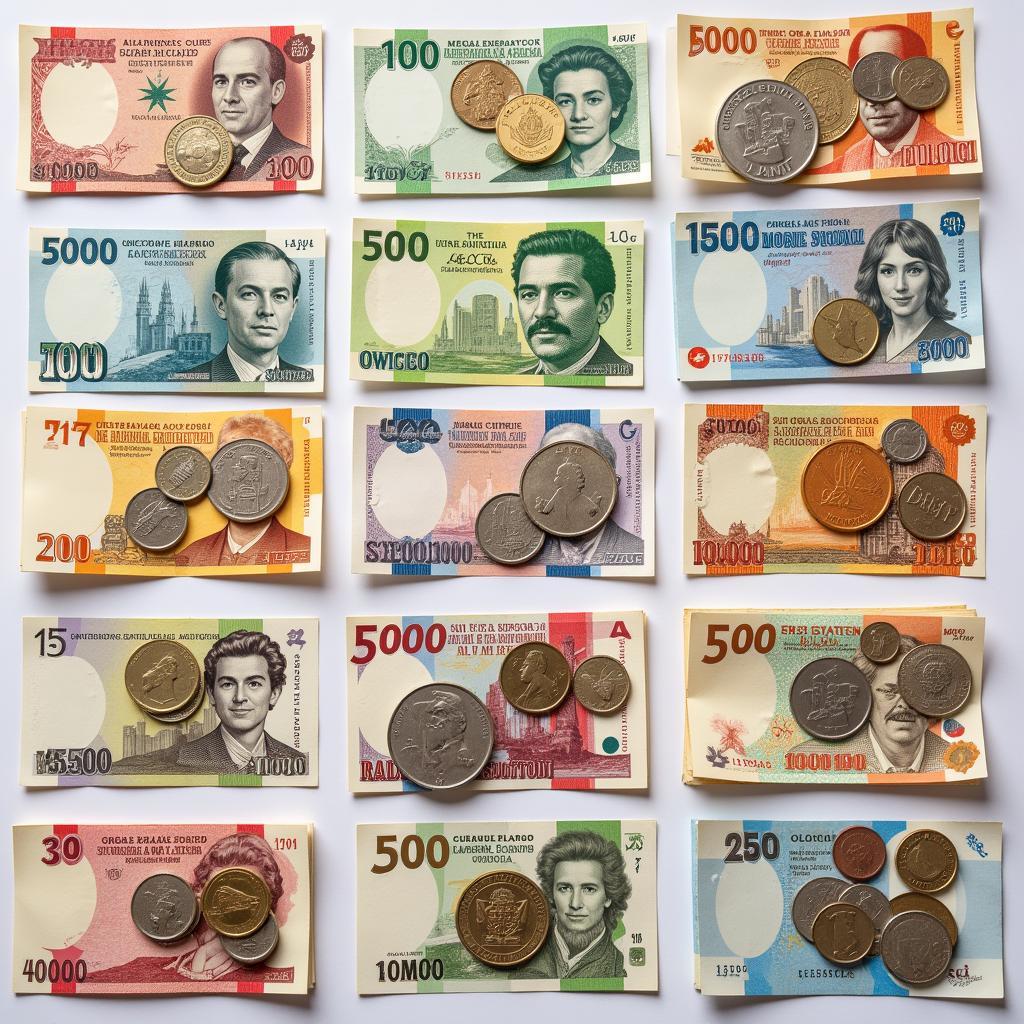Money Vs Currency. These two terms are often used interchangeably, but a closer look reveals key distinctions. What exactly sets them apart, and why does it matter? This article delves into the core differences between money and currency, exploring their roles in the financial world and how they impact our daily lives.
What is Money?
Money, at its most fundamental level, is anything that serves as a medium of exchange, a unit of account, and a store of value. Think of it as a tool that facilitates transactions, allows us to measure the worth of goods and services, and provides a way to save purchasing power for the future. Money doesn’t necessarily have to be physical; it can exist in various forms, from precious metals like gold and silver to digital entries in a bank account.
The Functions of Money
- Medium of Exchange: Money simplifies trade by eliminating the need for bartering. Instead of exchanging goods directly, we use money as an intermediary.
- Unit of Account: Money provides a standard unit for measuring the value of different goods and services, making it easier to compare and trade.
- Store of Value: Money allows us to store purchasing power for future use. We can save money today and use it to purchase goods and services later.
What is Currency?
Currency, on the other hand, is a specific form of money issued by a government or central bank. It’s the physical representation of money in the form of banknotes and coins, as well as digital forms like central bank digital currencies (CBDCs). Currency is a subset of money, specifically referring to the official medium of exchange within a particular country or economic zone.  Các loại tiền tệ khác nhau trên thế giới
Các loại tiền tệ khác nhau trên thế giới
Characteristics of Currency
- Issued by a Governing Authority: Currency is typically issued and regulated by a government or central bank.
- Legal Tender: Currency is legally recognized as a means of payment within a specific jurisdiction.
- Physical and Digital Forms: Currency can exist as physical banknotes and coins, or in digital formats like CBDCs.
Money vs Currency: Key Differences in a Nutshell
While the terms are often used interchangeably, understanding the subtle but important differences between money and currency is crucial for grasping the complexities of the financial system. Money is the broader concept, encompassing anything that fulfills the three core functions. Currency is a specific type of money, officially issued and regulated by a governing authority. Think of money as the overarching category, and currency as one of its many forms. For instance, even cryptocurrency, while not a government-issued currency, can function as money if it is widely accepted as a medium of exchange, unit of account, and store of value.
Practical Examples of Money vs Currency
Consider someone trading baseball cards. While the cards themselves are not currency, they can function as money within that specific community, acting as a medium of exchange. Similarly, working capital vs cash are important concepts in finance. Understanding the interplay between various financial instruments and their roles as money or currency provides a more nuanced understanding of the financial landscape.
Conclusion: Navigating the Financial World
The difference between money vs currency is subtle yet significant. Money is the broader concept, encompassing various forms of exchange, while currency is a specific type of money issued by a governing body. Understanding this distinction is fundamental to navigating the complexities of finance. For example, knowing the difference between Canadian dollar vs US dollar is crucial for international transactions. Grasping these core concepts empowers us to make informed financial decisions and navigate the ever-evolving world of money and currency.
FAQ
- Can something be money but not currency?
- What are the different forms of currency?
- How is the value of currency determined?
- What is the future of money and currency?
- How does inflation affect money and currency?
- What are the benefits of using digital currencies?
- What are the risks associated with using digital currencies?
Mô tả các tình huống thường gặp câu hỏi.
Nhiều người thường nhầm lẫn giữa tiền và tiền tệ, đặc biệt trong bối cảnh giao dịch quốc tế hay đầu tư tài chính. Việc không hiểu rõ sự khác biệt này có thể dẫn đến những quyết định sai lầm. Ví dụ, khi so sánh giá trị của Canadian dollar vs US dollar, cần hiểu rằng chúng đều là tiền tệ, nhưng giá trị của chúng so với các loại tiền tệ khác có thể biến động. Tương tự, việc phân biệt giữa working capital vs cash cũng rất quan trọng trong quản lý tài chính doanh nghiệp.
Gợi ý các câu hỏi khác, bài viết khác có trong web.
Bạn có thể tìm hiểu thêm về các chủ đề liên quan như: plants vs zombies 2 windows 10 free download hoặc gardens vs graves battlegrounds codes.